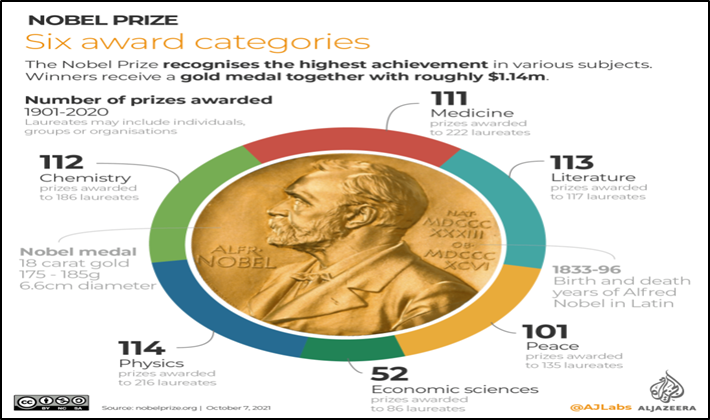In News:
- Svante Pääbo, a Swedish scientist, was recently awarded the Nobel Prize in Physiology (Medicine) for his discoveries about the genomes of extinct hominins and human evolution.
What’s in today’s article:
- About the work of Nobel Prize-winning scientist
- About the Nobel Prizes
The work of Nobel Prize-winning scientist:
- Svante Pääbo accomplished something near impossible by sequencing the genome of the Neanderthal, an extinct relative of modern humans, and also made the sensational discovery of a previously unknown hominin, Denisova.
- Hominins are an extinct ape species assumed to be related to modern humans.
- He invented a completely new scientific discipline called paleogenomics, which focuses on reconstructing the DNA and genetic information of extinct hominins.
- Pääbo also discovered that gene transfer occurred from these now-extinct hominins to Homo sapiens following the 70,000-year-old migration out of Africa.
- An example of the relationship between evolution and biology is when Pääbo extracted DNA from bone specimens from extinct hominins, from Neanderthal remains in Germany's Denisova caves.
- The Denisovan version of the gene EPAS1 confers a survival advantage at high altitudes and is common among modern Tibetans.
Significance:
- The work appears to have been focused on human evolution and the role it has played in shaping our health and biological systems over time.
- This could result in a one-of-a-kind resource that the scientific community can use to better understand human evolution and migration.
- Svante Pääbo's groundbreaking discoveries will serve as the foundation for investigating what makes us uniquely human.
- We now know that archaic gene sequences from our extinct ancestors influence the physiology of modern humans.
- This ancient gene flow to modern humans has physiological implications, such as influencing how our immune system responds to infections.
About the Nobel Prizes:

- Nobel Prizes are widely regarded as the highest honors available in their respective fields.
- According to Alfred Nobel's will, the Nobel Prize is five separate prizes (Physics, Chemistry, Medicine, Literature and Peace), awarded annually to those who, during the preceding year, have conferred the greatest benefit to humankind.
- Alfred Nobel was a Swedish chemist, engineer and industrialist best known for inventing dynamite.
- In his will, he directed that all of his "remaining assets" be used to establish five prizes known as the "Nobel Prizes."
- Nobel Prizes were first awarded in 1901, five years after Nobel's death.
- The economics award, officially known as the Bank of Sweden Prize in Economic Sciences in Memory of Alfred Nobel, was established in 1968 by Sweden's central bank, not by Nobel.
- The Nobel Peace Prize is awarded in Norway, while the other prizes are presented in Sweden.
- The Nobel Prize is administered by the Nobel Foundation and its winners (known as a "laureate") are selected by the Royal Swedish Academy of Sciences.
- Each prize is worth 10 million kronor (nearly $900,000) and will be handed out with a diploma and gold medal on December 10 - the date of Nobel's death in 1896.
- A prize may not be shared by more than three individuals, but the Nobel Peace Prize may be awarded to organizations with more than three members.
- Although Nobel Prizes are not given posthumously, if a person is nominated for one and dies before receiving it, the prize is still given.









